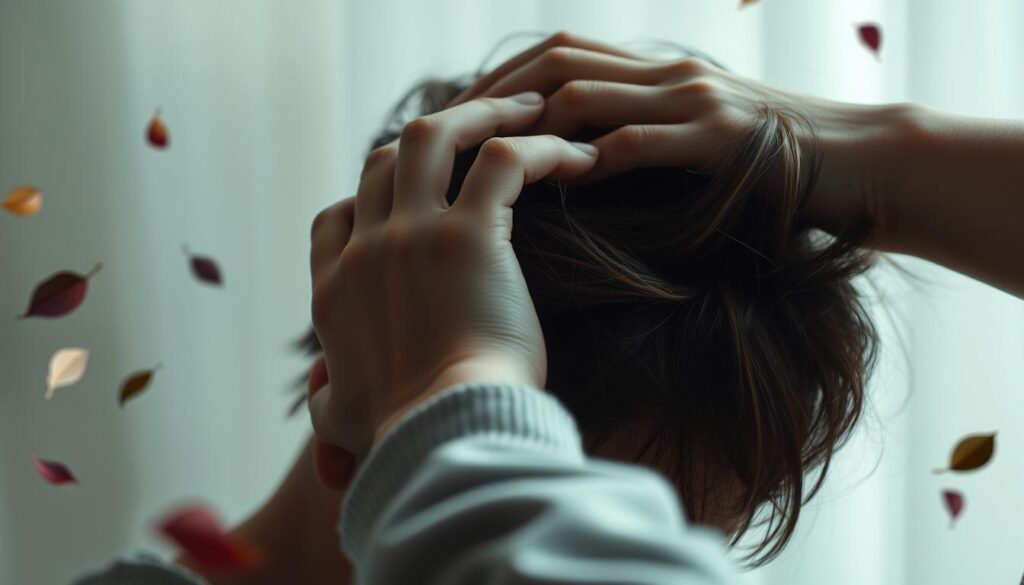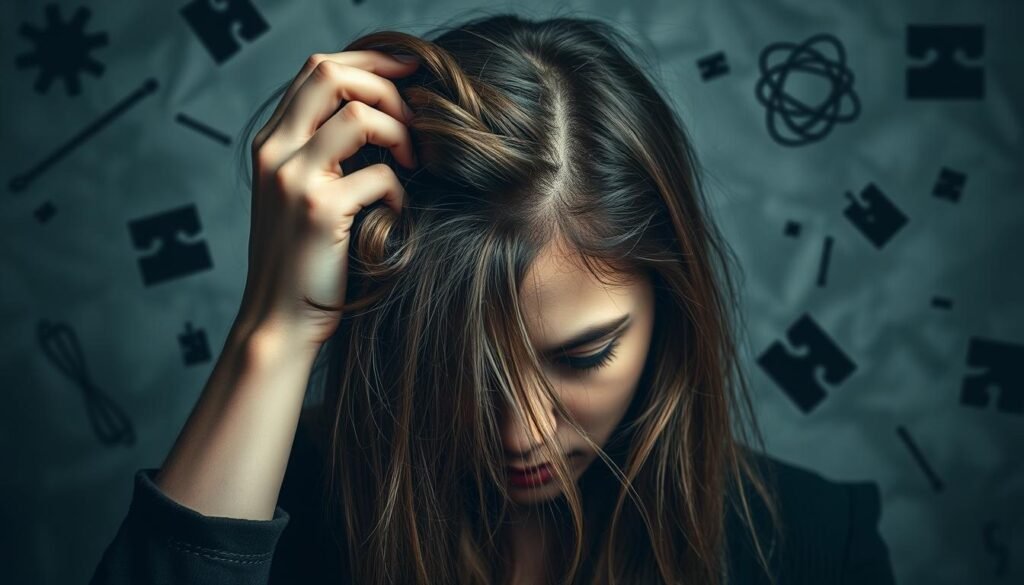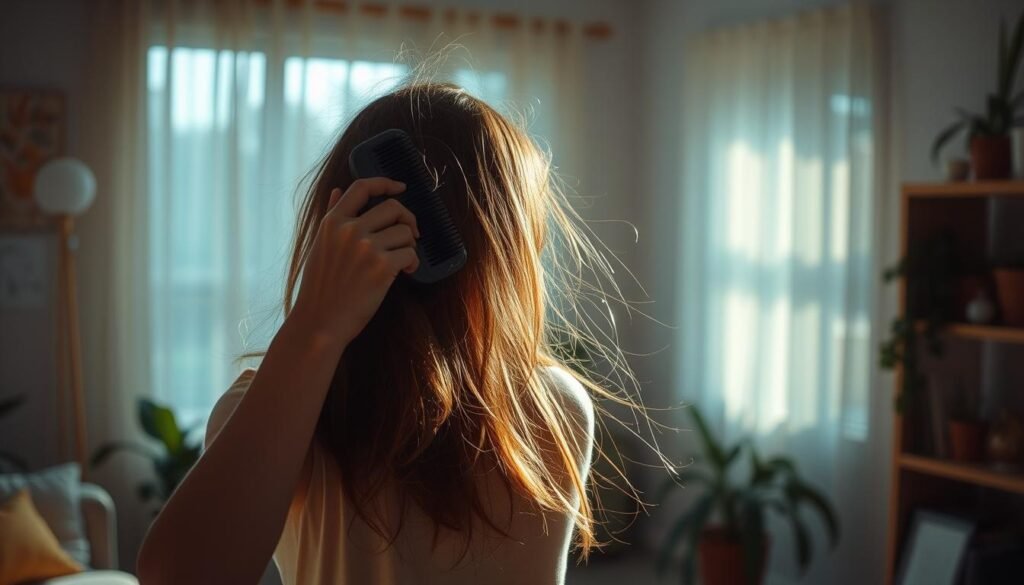Telogen effluvium is the second most common hair loss type, often caused by stress. Many find their psychological state directly affects their hair health. Excessive anxiety plays a big role in this. With many facing stress and its effects, it’s vital to understand how anxiety and hair loss are linked. This guide looks into anxiety’s role in hair loss, explores common types, and suggests effective treatments.
Key Takeaways
- Telogen effluvium is a common type of hair loss seen by dermatologists.
- Alopecia areata affects over six million people in the U.S., indicating a widespread issue.
- Excessive stress can lead to different forms of hair loss, including telogen effluvium and alopecia areata.
- Specific treatments are available, such as topical minoxidil, which may take several months to show results.
- Managing stress effectively can lessen its effects on hair loss and improve overall well-being.
Understanding the Connection Between Anxiety and Hair Loss
Anxiety affects your health in many ways, including your hair. It causes your body to react as if in danger. This reaction increases stress hormones, like cortisol. These hormones can hurt your hair health. Anxiety can cause hair follicles to rest too soon. This is known as mental health hair shedding.
Stress can lead to hair loss conditions like Telogen Effluvium (TE). TE happens when stress disrupts hair growth. It makes hair thin out. Another condition, Alopecia Areata, causes big hair loss spots suddenly. This can be very upsetting.
Hair loss from stress shows up about 6 to 12 weeks after a hard time. If stress stays, you might see more hair loss or even go bald. Stress can take away nutrients your hair needs to grow.
To help your hair, you should treat your anxiety. Exercise, meditation, and talking to a therapist can help. For more support, see a professional for anxiety hair loss treatment. They can help you manage stress and improve hair growth.
| Condition | Description | Timeframe for Hair Loss |
|---|---|---|
| Alopecia Areata | Causes clumps of hair loss without apparent reason | Varies; often sudden |
| Telogen Effluvium | Thinning hair due to stress, affecting the hair growth cycle | 6-12 weeks after stress |
What Happens to Your Hair During Periods of Stress?
Stress and hair loss often go together. During intense stress, your hair’s growth cycle gets disrupted. This means hair can move from growing to resting phase, causing thinning. Dr. Ya-Chieh Hsu from Harvard University found that stress increases corticosterone levels. This leads to more hair falling out.
Experiments with mice shed light on this. Mice without adrenal glands had non-stop hair growth. But, when corticosterone was added back, these benefits disappeared. Higher levels of this stress hormone made hair grow slower. This happened because the hair follicles were in a resting state for too long.
The cause is all about dermal papilla cells beneath the hair. These cells trigger hair growth but get affected by corticosterone. However, introducing Gas6 to these stressed mice rejuvenated hair growth. So, despite stress, it’s possible for hair to grow with the right trigger.
One stress-related condition, telogen effluvium, makes you lose up to 300 hairs a day. But, there’s good news! This condition usually gets better by itself in 6 to 9 months. That’s as your body recovers from stress.
Understanding how stress impacts hair loss is key. It also shows the importance of stress management for hair health. If you notice your hair thinning, don’t wait. Early action can help your hair return to its normal cycle faster.
Key Types of Stress-Related Hair Loss
Understanding stress-related hair loss is crucial. There are three main types: telogen effluvium, alopecia areata, and trichotillomania. Each one has unique signs and is linked to stress.
Telogen Effluvium and its Impact
Telogen effluvium often starts after big stress or health changes. It makes a lot of hair move to the shedding phase. This means people can lose up to 300 hairs a day.
Most cases end in less than six months. Acute telogen effluvium shows hair loss two to three months after stress. Chronic telogen effluvium usually affects women aged 30 to 60 and can make hair thin over time without an obvious reason.
Alopecia Areata: An Autoimmune Reaction
Alopecia areata causes patchy hair loss due to an autoimmune response. Stress can trigger it, leading the immune system to attack hair follicles. This can create unpredictable bald spots, or even total hair loss on the scalp.
People with alopecia who also have anxiety disorder may improve their hair condition by managing stress.
Trichotillomania: The Compulsive Hair-Pulling Disorder
Trichotillomania involves a strong urge to pull out one’s hair, often due to stress or anxiety. This action can offer temporary stress relief. However, it leads to bald spots where hair has been pulled out.
Treating the underlying emotional issues, perhaps through therapy, can help stop the cycle.
Knowing about these types can help people find the right support and resources. For extra details on how stress affects hair loss, check out this comprehensive guide.
Can Anxiety Cause Hair Loss?
Anxiety can affect our wellbeing, including our hair health. Stress might actually impact your hair follicles. Studies show anxiety can lead to telogen effluvium. This condition causes more hair to fall out than usual. Eventually, your hair might become thinner.

Trichotillomania is another issue that anxiety can cause. It’s the need to pull out your hair. For some, it results in losing a lot of hair and feeling really upset. Anxiety might also make you lose a bit of hair because it messes with how your hair grows.
Being anxious can also mess up your eating habits. This can make it hard for new hair to grow. Stress leads to cortisol in your body which changes your hair’s growth. You may see more hair falling out two months after being really stressed. Yet, hair loss from stress isn’t always simple. Things like genes or medicines could also be why.
Sometimes, losing hair can make you anxious. This creates a tough cycle of worry and hair loss. It shows why managing stress for hair growth is important. Tackling anxiety could help your hair grow back. Exercise, hobbies, and mindfulness can lower stress. Also, taking an anxiety quiz could help figure out how stressed you are.
Even though anxiety and losing hair are linked, they might not cause each other. It’s key to get help from experts to know what to do. They can help figure out what’s going on with your health.
Recognizing Symptoms of Hair Loss Due to Anxiety
It’s important to spot signs of hair loss from anxiety early. Knowing signs like thinning and shedding helps manage the issue. Hair often falls out more after stressful events. Spotting these signs early leads to better ways to cope.
General Signs of Hair Thinning and Shedding
Normally, losing 50-100 hairs a day is okay. But with stress, you might lose more. You should watch for these signs:
- Increased hair loss beyond the normal daily shedding rate
- Thinning hair across the scalp without the formation of defined bald spots
- Changes in hair texture, often appearing more brittle and fragile
- Hair loss that persists for an extended period, typically spanning 3-6 months
Identifying Patterns in Hair Loss
Knowing how stress-related hair loss happens is key. Stress can cause lots of hair to fall out. This leads to even shedding instead of just spots. Keeping track of hair loss helps. Things like good sleep and exercise help your hair too. Hair grows back slowly, usually in 6-9 months.
By understanding these symptoms and patterns, we can better handle anxiety-related hair loss. This allows us to find ways that really help us.
The Biological Mechanism: How Anxiety Influences Hair Loss
To understand how stress affects hair, it’s key to look at the body’s responses. Stress makes the body release more cortisol, a hormone. This messes up the normal hair growth cycle. It leads to conditions like telogen effluvium and alopecia areata, both closely tied to stress-induced hair loss.
The hair growth cycle has three phases: anagen, catagen, and telogen. Stress can push hair into the telogen phase too soon. This causes lots of hair to fall out. Telogen effluvium means a sudden but usually temporary loss of hair.
Alopecia areata is a hair loss condition caused by stress-related autoimmune responses. It creates random bald patches on the scalp and body. Only a few people get it, but it can cause a lot of hair loss.
Trichotillomania is when people pull out their hair because they can’t help it, often due to stress. About 1-2% of people suffer from it. It’s most common in teens and causes major hair loss as they try to cope.
Below is a table summarizing the various types of stress-related hair loss along with their characteristics:
| Type of Hair Loss | Description | Impact of Stress |
|---|---|---|
| Telogen Effluvium | Abrupt, diffuse hair shedding, often temporary | Triggered by chronic stress or hormonal changes |
| Alopecia Areata | Patchy hair loss, can affect scalp and body | Autoimmune response often exacerbated by stress |
| Trichotillomania | Compulsive hair-pulling behavior | Strong urge often linked to anxiety |

Learning about these biological processes helps us understand the link between stress and hair loss. It also shows why it’s crucial to deal with anxiety to keep our hair healthy.
Consulting Healthcare Professionals
Feeling upset about anxiety-related hair loss is common. It’s important to see healthcare experts for the right diagnosis and treatment. Primary doctors are key in assessing this condition. They can send you to skin doctors who know a lot about hair loss.
Talking openly about what you’re going through is key. You should be able to share if your hair is suddenly falling out, getting thinner, or if bald spots appear. Knowing these details helps figure out the reason, like stress-related Telogen Effluvium or Trichotillomania.
To understand how to tackle anxiety-linked hair loss, look at this table showing common treatment suggestions:
| Treatment Type | Description | Effectiveness |
|---|---|---|
| Medical Treatments | Medications like Minoxidil can help stimulate hair growth and may be prescribed. | Moderate to High |
| Psychotherapy | Cognitive-behavioral therapy can assist individuals in managing anxiety, addressing compulsive behaviors related to hair loss. | High |
| Nutritional Support | Supplements containing vitamins like biotin and zinc provide necessary nutrients for hair health. | Moderate |
| Alternative Therapies | Scalp massages and essential oils have been noted to improve blood flow to hair follicles, potentially helping with hair growth. | Moderate |
Good anxiety hair loss treatment usually involves several methods. Getting help early improves the chances of dealing with anxiety and hair issues successfully.
Effective Treatments for Anxiety-Related Hair Loss
Dealing with anxiety-related hair loss means taking several steps. It’s vital for folks undergoing this tough situation. They need a mix of medical care and mental health strategies.
Medical Treatments: Minoxidil and Other Options
Minoxidil is a top choice for battling hair loss. It’s great at encouraging hair to grow back for those stressed enough to lose it. Studies show Minoxidil can jump-start hair follicles, which is super for stress-related hair thinning. Other options like MDhair Restore Shampoo mix DHT blockers and plant extracts to nurture hair.
Psychotherapy and Anxiety Management Strategies
Psychotherapy tackles the mental side of losing hair from stress. Cognitive Behavioral Therapy (CBT) is a big help in controlling anxiety, easing one cause of hair loss. Adding in calm activities like yoga, deep breaths, and writing down thoughts helps lower stress. This approach doesn’t just improve your mood. It also stops the vicious cycle of stress causing more hair loss. Find out more info here.
| Treatment Type | Details | Benefits |
|---|---|---|
| Minoxidil | Topical solution for hair regrowth | Stimulates hair follicles and promotes growth |
| MDhair Restore Shampoo | DHT-blocking shampoo with botanicals | Supports healthy hair growth and scalp health |
| Cognitive Behavioral Therapy | Therapy addressing thought patterns and behaviors | Reduces anxiety and stress, impacting hair loss |
| Relaxation Techniques | Yoga, deep breathing, journaling | Helps manage anxiety and alleviate stress |
Using these treatments together offers a robust plan. It helps individuals beat anxiety-linked hair loss. This journey boosts recovery and builds self-esteem.
Natural Remedies for Anxiety Hair Loss
There are many natural ways to deal with hair loss caused by anxiety. These include herbal supplements that nourish the hair. Making essential lifestyle changes to lower stress is also key. A total approach can greatly better hair health and wellbeing.
Herbal Supplements and Nutrients for Hair Health
Some herbal supplements help keep hair healthy. Ingredients like saw palmetto can help hair grow. A study found that taking 320 mg each day made hair denser. Pumpkin seed oil, used daily for six months, increased hair count by 40%.
Eating foods rich in nutrients can make hair stronger. Proteins from foods like beans, lean meats, and fish are vital for hair growth. Also, taking supplements with biotin, zinc, and iron is key. People who don’t eat meat may need to double their iron intake.
Lifestyle Changes to Reduce Stress
Changing how you live can cut down stress. This helps ease anxiety and better hair health. Getting regular exercise boosts both body and mind. Sleeping enough helps the body recover and stay balanced. Activities like meditation and gentle scalp massages can boost blood flow. This might help hair grow.
To get the best results, mix these methods with herbal supplements. This is a good plan for handling anxiety-related hair loss. Remember, focusing on well-being and eating well is crucial to get the most benefit.
| Herbal Supplement | Recommended Dosage | Potential Benefits |
|---|---|---|
| Saw Palmetto | 320 mg daily | Improves hair growth and density |
| Pumpkin Seed Oil | 400 mg daily | Increases hair count significantly |
| Ashwagandha | Dosage varies by product | May help reduce stress and improve hair health |
Coping with Anxiety and its Effects on Hair
Many people losing hair get caught in a stress spiral. Stress and worry make their condition worse. They face pressure from society, feeling not good enough, especially women and kids. This makes it hard to handle stress for hair growth amidst anxiety’s grip.

Handling anxiety’s effects on hair needs practical strategies. Mindfulness and meditating help calm anxious thoughts. They let people live in the now. Deep breaths, taking six counts in, holding, and out, can stop anxiety fast.
It’s key to practice self-care for overall health. A healthy lifestyle, with exercise and good food, helps both mind and hair. Joining support groups gives a community feel and good advice on handling hair loss due to stress.
Seeing doctors or therapists can make coping better. Cognitive Behavioral Therapy (CBT) works well against stress-caused hair loss. For lighter anxiety, self-care might be enough. But worse cases may need professional help. Realizing you need a full plan is a big step towards feeling and looking better.
| Technique | Benefits |
|---|---|
| Mindfulness Meditation | Helps clear the mind and refocus on the present moment. |
| Deep Breathing Exercises | Aids in alleviating sudden feelings of anxiety. |
| Regular Exercise | Promotes endorphin release, reducing stress levels and enhancing mood. |
| Healthy Diet | Supports overall health and can impact hair growth positively. |
| Peer Support Groups | Fosters a sense of belonging and communal strength. |
Dealing with hair loss’s emotional side seems hard, but the right methods and support can make a difference. Anxiety can be managed for healthy hair growth. For more on how hair loss affects the mind, see this informative resource.
Conclusion
The link between anxiety and hair loss is now clear: yes, anxiety can cause hair to fall out. Stress can lead to conditions like telogen effluvium, resulting in more hair shed than normal. Usually, it’s normal to lose 50 to 100 hairs a day, but stress can increase this.
Managing the effects of anxiety on hair calls for a two-pronged strategy. This means addressing both the mind and the body. Those affected should think about seeing doctors for both therapy and medical treatments. Using natural remedies can help manage stress and aid hair growth, too.
Getting over anxiety-related hair problems takes time. It’s key to understand that while anxiety can cause hair loss, it’s also possible to overcome it. With the right help and effort, people can improve both their mental and emotional well-being. This includes getting their hair to grow back.